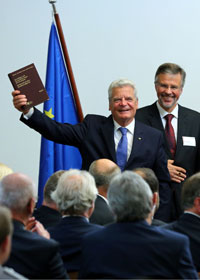 From left to right: Joachim Gauck (President of the Federal Republic of Germany), Peter Masuch (President of the Federal Welfare Court) (© Andreas Fischer, Kassel).
From left to right: Joachim Gauck (President of the Federal Republic of Germany), Peter Masuch (President of the Federal Welfare Court) (© Andreas Fischer, Kassel).On September 11, 2014, President Joachim Gauck presented the welfare state memorandum, a Denkschrift, at the German Federal Welfare Court in Kassel on the court's 60th jubilee. The memorandum is an unusual Festschrift to which the Center for Social Policy Research (ZeS) and the Collaborative Research Center 597 "Transformations of the State" (TranState) of the University of Bremen have contributed considerably. The title of the memorandum volume is "Foundations and Challenges of the Welfare State". It is published by the Erich Schmidt Verlag in Berlin, a welfare law publisher.
The memorandum is 823 pages long. More than 300 pages address thereby the present challenges of the welfare state; the other contributions take stock of historical and legal perspectives. In a path and institution dependent sector such as the welfare state, though, looking back tells a lot about present and future trajectories. At the end of his speech, President Joachim Gauck invited the memorandum editors and other experts to a colloquium at his official residence Bellevue Palace in Berlin. Topics of discussion will be challenges to the welfare state but also to its respective research. Especially the weakening infrastructure at German universities posits such a challenge due to its crucial/fundamental importance for the public debate on welfare state reforms.
A Festschrift for a court in shape of a memorandum is a quite unusual format. The memorandum is not, as it would have been expected, about lauding the Federal Welfare Court and its adjudication in the last 60 years. The court rather uses the occasion to look beyond - at the state of the welfare state and its future. It looks at the fate of the 'object' of its own jurisprudence, a moving target that has a take on 50 percent of all state expenditures and on one third of the Gross Domestic Product (GDP) in Germany. Having this in mind, the Court reaches far beyond jurisprudence (9 chapters) into economics, history, philosophy, social policy, and sociology (29 chapters) in its memorandum. Though welfare state challenges are relevant in the OECD world, a well developed system of welfare courts is a German distinctiveness: Germany has fused the rule of law with the welfare state. This leads to something unique, which the Germans dub Sozialstaat. In Germany, Sozialstaat and the welfare court system are identical twins (Preface, p. X f.). It did not happen by chance that it was a German welfare court which took the initiative for an overall assessment of the welfare state landscape.
The strong participation of Bremen academics is revealed by many researchers who either are currently working at Bremen University (Olaf Groh-Samberg, Friedhelm Hase, Stephan Leibfried, Steffen Mau, Frank Nullmeier, and Herbert Obinger), were members at an earlier time (Stefan Gosepath, Florian Rödl, Ilona Ostner, Manfred G. Schmidt, and Peter Starke) or are strongly connected to the Bremen Centre for Social Policy Research, the ZeS, (like Franz-Xaver Kaufmann, who was the Chairman of the ZeS' founding advisory board from 1990 to 1998). Kaufmann contributed the conclusion to the memorandum, which is a good start to the whole volume (pp. 777-811).
Bremen participation will also be strong in the second volume of that Denkschrift on "Knowledge Production by Judges and Academia: The Federal Welfare Court's Knowledge Production and Welfare State Research" that will be published in 2015. Involved Bremen researchers are: Stefan Gress, Johannes Huinink, Heinz Rothgang, and Winfried Schmähl. This volume results from the conference that took place on September 9 and 10 in Kassel. It brought together the Federal Welfare Court judges with chairs from five disciplines (economics, law, philosophy, political science, and sociology), all involved in social policy research. Eight topics - and eight court jurisdictions - came into focus: long-term care, old age security, health, labour market policy, poverty, family, disability, and the financing of social security. Since the whole event took place under the umbrella of the 48th Welfare Judges Week, judges from lower courts participated throughout.
Two of the editors have a Bremen origin: Stephan Leibfried, Director of the Collaborative Research Center 597 "Transformations of the State" and principal investigator at the Centre for Social Policy Research (ZeS), has been a professor in Bremen since 1974; as well as Peter Masuch, President of the Federal Welfare Court in Kassel, a University of Bremen Law School alumnus of the class of '72, who had been a welfare court judge in Bremen in the 1980s and a state welfare court judge in Bremen in the 1990s.
More information:
Erich Schmidt Verlag: TOC and more information about the publication.
Contact:
Prof. Dr. Stephan Leibfried (verstorben)











